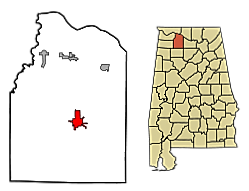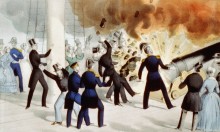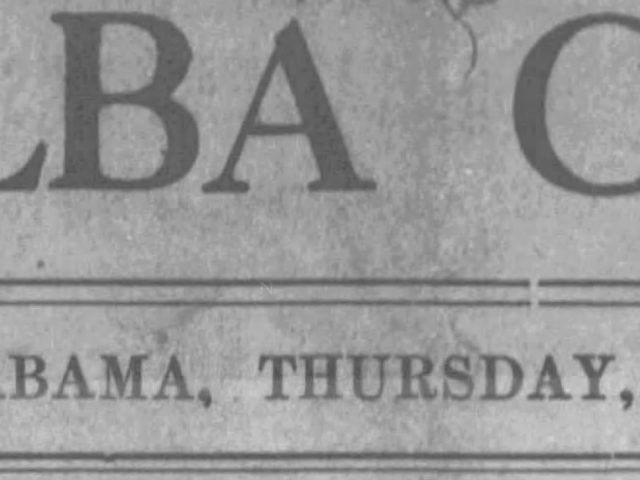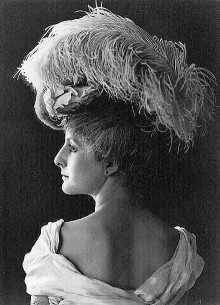Check your Patreon APP Alabama Pioneers Patrons community each morning for the latest stories and share your opinions through Comments.
Become an Alabama Pioneers Patroners Patron
JOIN US
Only Alabama Pioneers Patroners Patron can comment on posts.
In 1818, before Alabama became a state, Anne Newport Royall (June 11, 1769 – October 1, 1854) was a traveler in Alabama. After her husband died, she was left penniless and she toured Alabama for four years as one of the first newspaperwomen in America. She wrote letters to her friends about Alabama and the letters were published as a book entitled Letters from Alabama in 1830.
On March 12, 1819, Anne was in Moulton Alabama (now in Lawrence County, Alabama)where she met an early settler, Burlison, in Lawrence County, Alabama who was originally from Tennessee. In this story, he describes his experience in serving with General Andrew Jackson who later became President. The letter has been transcribed exactly as published. (Including the misspellings). It reveals the character of the 7th President of the United States by the incidents described. What do you think about this letter? Comment below.
Moulton, March 12th, 1819.
Dear Matt,
I Can find nothing better to amuse you than the anecdotes and history of the old Tennesseean, particularly as I know you to be partial to them. Mr. Burlison is equal to the best library; and, in fact, no library contains a greater variety of amusement. He can commence at the beginning of his life, and relate every incident, not only of himself, but of the times. But chiefly I love to hear his anecdotes of General Jackson’s struggles and difficulties in his various campaigns, and the incidents of those brave men who suffered with him.

Moulton, Lawrence County, Alabama
There is now, I am told, in press, a well written book, which gives a detail of the southern army, and the principal incidents of General Jackson’s life. Such a book is much wanted, and must be very gratifying to the friends and admirers of this great man. The smallest incident of his companions, and his unequalled courage, is devoured with avidity.
SEE ALL BOOKS BY DONNA R. CAUSEY
Settlers idolize him
The settlers of this new country love him to idolatry; and my Tennessee friend is not amongst the least. He was with the General during the whole of the war—as also two of his sons, and a son-in-law. The hardships and privations endured by the General, and his men, are almost incredible. Mr. Burlison, as well as his brother, and a son of each, held a captain’s commission in the Creek war; and he gives the clearest description of it I have ever heard.
He says the army suffered almost to starvation for want of provisions; and as they were principally militia, it required all the General’s skill and address to keep the army together; sometimes, however, a mutinous spirit would appear, in spite of him, and once in particular, their sufferings were so great, that all the appeals of the General to their patriotism, failed; and though, like a common soldier, he shared all their wants and hardships, it would not do, they determined to leave him.
First Man who moved one step forward was a dead man
His appeals were so pathetic on this occasion as to draw tears from the bystanders. After he thought they were reconciled, he rode out alone, one day, and was astonished to find the whole brigade in the act of marching to Tennessee. He instantly snatched a gun from one of the men, and his left arm being useless from a wound, he rested the gun between his horses ears, and placing; himself in front of the column, swore “the first man that moved one step forward, was a dead man.”
 General Andrew Jackson
General Andrew Jackson
His gun was cocked, ready to fire, and at this critical moment his friends, having missed him, flew to his side. Thus each party stood some minutes; at length the men turned back to camp. I thought I had seen courage and boldness before,” said Mr. Burlison, but there is not such a man in the world—for one man with one arm to stop a whole brigade! He is the most undaunted being in creation.” Mr. Burlison was one of those who adhered to General Jackson.
Act conveys a better idea than volumes written
That inimitable writer, Voltaire, observes, that to convey a just idea of the characteristics of men, you must strictly observe the expressions which accompany their actions.” This was fully illustrated by the expression of General Jackson as he was steadying the gun between his horses ears. This act, and the expression that accompanied it, conveys a better idea of the man than volumes elaborately written.
At another of those mutinies, he threw himself before them, and told them they should not succeed but by passing over his dead body. “In opposing you I am only doing my duty, and I will die where I stand, before I will dishonor my country. What! will you have it said, you abandoned your General?”
The heart of your General has been pierced
On another occasion, he addressed them in a speech of some length, and thus concluded: ” I know you are anxious to see your families—and so am I—yet, do stay a little longer!— Go with me—the enemy is near—we will conquer him—and then go to our homes!” Again, he told them, “the heart of your General has been pierced!
The first object of his affections, and the first glory of his life, were the volunteers of Tennessee. The very name recalls to my mind a thousand tender recollections. Oh, then, my brothers in arms, do not, do not leave me.” You see how much he bore rather than resort to cruel measures towards those he loved dear as his own soul. He humoured and carressed his men to such a degree, Mr. Burlison says, that they were like spoiled children—the camp exhibited nothing but a scene of uproar— singing songs, laughing, and loud talking.
Laxity led to mutinies
This laxity of manners led them to frequent mutinies, till the General was exhausted, and he was compelled to make an example of one of the ringleaders, though it wrung his heart with the bitterest sorrow. After this, he had no trouble with the army. Mr. Burlison, who was present at the execution, said he had seen many fall in battle—he had seen many wounded—and had witnessed distress and death in all its shapes, but never saw any thing so awful, or that shocked him more, than this execution.
The army was drawn out on parade—the criminal seated in the centre on a stool—his eyes tied with a handkerchief, and eight men, with never failing rifles, standing round him. Mr. Burlison’s brother was one, but neither Mr. Burlison, his brother, nor a single man in the army, least of all, the crimnal, expected he would be shot, till the word fire;” and eight bullets pierced him at once! It was expected he would be pardoned, as many had been before. That night not a word was heard in camp. They were all as silent as death. What an effect! General Jackson had no more plague with mutinies.
Carried wagons up the mountains
The men, for want of roads, were compelled to take the horses from the wagons, and carry them up the mountains themselves. On these occasions, the General would throw off his coat and aid the men.
At one time he overtook the baggage wagons at Tennessee River, and the landing being steep, the men were in the act of pushing the wheels up the bank; the general, as usual, threw off his coat, and laid hold of the wheels, but seeing one man idle, “friend,” said the General, ” why do you not assist your companions?” “I am a corporall, Sir.” “Ah! and what of that; I am a Generall.” Some one by this time discovered who the stranger was, and informed the corporal. It is hardly necessar y to add that the corporal soon put his shoulder to the wheel.
Few equals in the art of war
General Jackson, however true it be, is, nevertheless, charged with partiality to his friends; and who is not? But it is said, by those who would lose their lives for him, that he advances his friends or intimates, in preference to others, equally capable. How did he know this? He preferred his friends, because his long acquaintance with their integrity and honor justified the choice! He is, also, accused of being arbitrary. Whether the charge be just or unjust, the result proves he has few equals in the art of war.
To judge accurately of any subject it requires a thorough knowledge of the thing submitted. War is an art, if it be not a science, which above all others, requires genius to conceive, skill to concert, wisdom to conduct, judgment to determine, promptness to execute, ability to command, fortitude to endure; patriotism, energy, firmness, decision, perseverance and courage. That General Jackson, possesses all these, in an eminent degree, his enemies admit.
But, independently of these, he possesses magnanimity, candour, humanity—a knowledge of the world—a liberal education. He is just, he is bountiful, and beyond, far beyond example, compassionate. This is his character. Now, where will you find a man, at once competent to judge of all these qualities! Not one in an hundred, to say the least. He must possess a competent knowledge of them in the first place; and, in the next place, he must be divested of prejudice. The first requires a mind highly improved by observation and study—and, as for prejudice, it is without remedy, if it be not in education. It requires men of the first science to judge accurately of a single blade of grass—but for an illiterate man to judge accurately on the qualities of a general, is out of the question; because, it would be to know what he does not, which is impossible! And, because, he does not understand the subject submitted, he has no idea within himself to correspond with it, and both are necessary to pass sentence of judgment. A man may be competent to decide upon the qualities in question; yet, he may err from prejudice, and all reasoning, founded on error, is false.
Prejudices arising
Of prejudice there are several— Prejudices arising from things, from words, from ourselves, from others; but none of these are so apt to lead us astray, as self. This is beautifully illustrated by the judge who reversed his own judgment, in the case of the ox; and envy in a few individuals has, doubtless, led them to instil it into the minds of others, who are unable to judge for themselves. In all countries there are not wanting something to keep envy and malice alive. It is prone in the human species. General Jackson has fewer enemies, perhaps, than any man of his notoriety. yet he has some.
With respect to General Jackson’s conduct at New Orleans, it reminds one of Columbus and the egg. He had undertaken to defend his country against fearful odds. It was an enterprize deep with hazard. It was a desperate case, and required a desperate remedy. His mind was equal to the enterprize, and every act of the man’s life proves, that love of country is his ruling passion. W hat a curse this passion of envy is. One would think that an American did not exist who did not admire General Jackson.
It would seem that the God of Nature has annexed to this unnatural passion of envy, its own punishment, whilst the objects of it sustain no injury. Wherever envy prevails, all is misery. It not only destroys all relish for those things we actually possess, but sinks us into contemptible wretches.
Wealth is a cause of envy
Wealth is another great cause of envy in the human family; and while I am on the subject, I will give you an anecdote of yesterday: Tom Envy came into my parlor, while he was under the influence of an affront put upon him by his rich neighbor. “D—n him,” said Tom; “I remember the time when he had to borrow twenty-five cents from me to pay for his breakfast; and do you think he had not like to have drove over me, just now! I saw him, driving along in his carriage. 1 was on foot. I knew his waiter. I stood still till he came up to me, and I bowed to him: “drive on,” said he, and went by me like fury.”
“Well, friend,” said I, ” let him do so.— He only degrades himself, while you are just as you were before. When he treats you ungratefully, he is guilty of the blackest crime, while you sustain no injury, except in your own imagination. But are you sure, friend, you would not act as he did, were you to change places with him? Wealth, you say, has had this effect upon him, and the same cause always produces the same effect. In that case you would act the part you now condemn.”
Tom was struck by the force of the argument, and after rolling up a fresh quid of tobacco, and thrusting it in his mouth, he said I was right, he believed; •” but, for all that, I would like to be rich, if it were only to mortify that upstart neighbor.” “There, now, you are wrong again. If you wish to punish him, only he more wise and virtuous, and the fame of your good name will mortify him much more than wealth. But if this does not satisfy you, you have only to go to work. If you wish to be a ric h man, industry and economy will soon do the business. You have the example of your rich neighbor before you; tread in his steps.” Tom scratched his head, and said, he believed it was dinner time, and departed.
“Some pity for riches—riches they obtain,
“And, watched by villains, for their wealth are slain!”
Yours, &C.
SOURCE:
Letters from Alabama, 1817-1822: Biographical introd. and notes by Lucille Griffith
ALABAMA FOOTPRINTS Confrontation: Lost & Forgotten Stories (Volume 4) is a collection of lost and forgotten stories that reveals why and how the confrontation between the Native American population and settlers developed into the Creek-Indian War as well as stories of the bravery and heroism of participants from both sides.
Some stores include:
- Tecumseh Causes Earthquake
- Terrified Settlers Abandon Farms
- Survivor Stories From Fort Mims Massacre
- Hillabee Massacre
- Threat of Starvation Men Turn To Mutiny
- Red Eagle After The War




